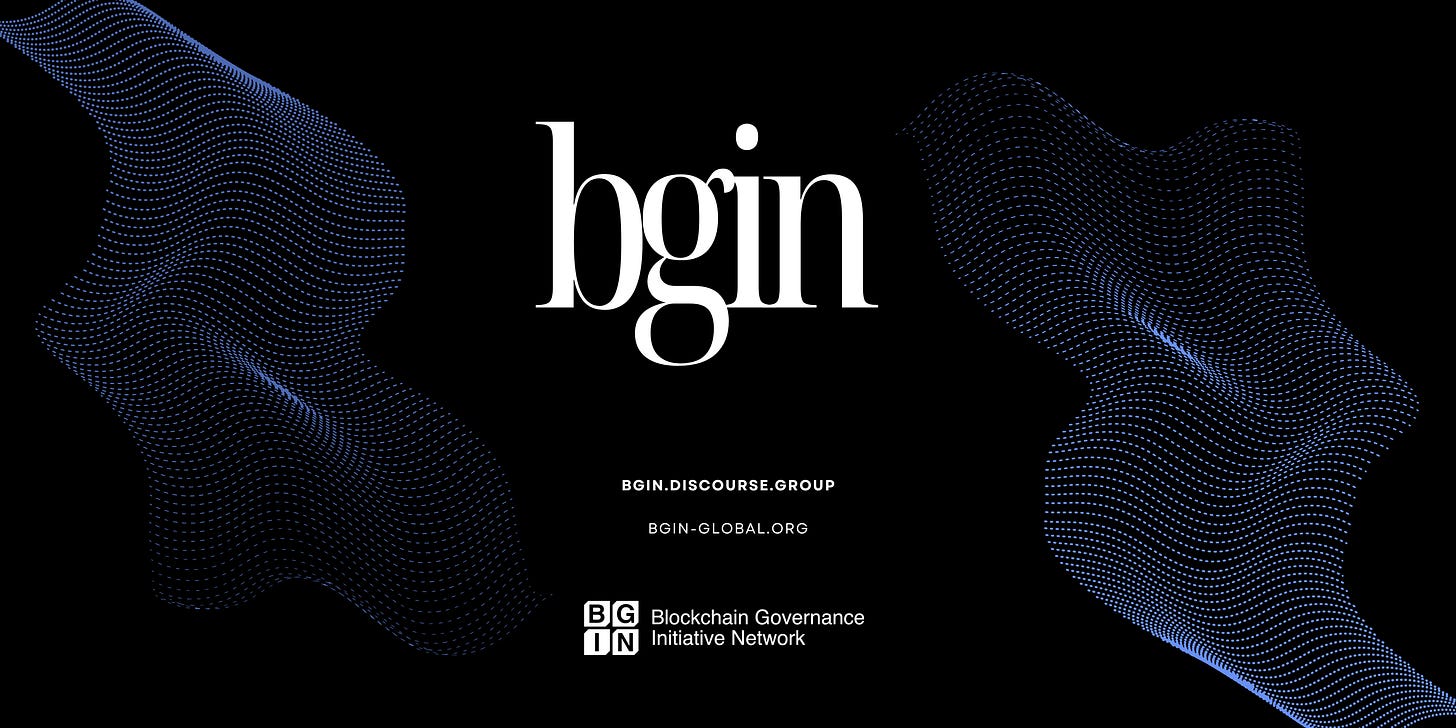Borgs on the Block: AI and Blockchain Confluence
BGIN Block 10 Insights
In Tokyo, 2024, the Blockchain Governance Initiative Network had its 10th meeting.
These insights are condensed to share as a sync with the greater community.
Join the forum conversation by the bgin.discourse.group.
Our working groups meet online, every two weeks, and discuss the most pressing subjects relating to;
Identity Key Management and Privacy (IKP) Working Group
Financial Applications & Social Economics (FASE) Working Group.
In a recent in-depth workshop, we explored the integration of AI with blockchain technology, examining their potential to enhance each other mutually and the implications for practitioners and policymakers. We continue this conversation regularly in the FASE Working group bi-weekly meetings.
Mutual Enhancements and Opportunities
The session opened with a vibrant discussion on how AI and blockchain can serve as force multipliers for each other. We considered how AI's capabilities in analysing blockchain transactions could bolster security and transparency while blockchain's immutable ledger provides a trusted dataset from which AI can derive actionable insights. The synergy between these technologies promises to transform sectors by decentralising governance and refining operational efficiencies.
Introducing Borgs: A New Paradigm
A standout moment was introducing the concept of "Borgs," entities where multiple legal frameworks dynamically interact and are driven by AI. This concept extends beyond traditional decentralised autonomous organisations (DAOs), proposing a more agile and responsive structure that could revolutionise organisational frameworks. (Star Trek nerd moments)
AI’s Role in Smart Contracts
Our discussion ventured into AI's role in developing and managing smart contracts. Although AI can significantly aid developers, complete reliance on AI in coding, especially within blockchain’s immutable structures, introduces risks such as the potential for errors that are hard to rectify. This led to a broader conversation about balancing leveraging AI's capabilities and ensuring robust human oversight to mitigate risks.
Tokenisation and NFTs
We delved into the innovative application of tokenising AI chatbots as NFTs, illustrating a transformative approach to revenue sharing in the digital economy. This example highlighted how blockchain could underpin AI development, ensuring a transparent and equitable distribution of economic benefits among developers and users.
Regulatory and Ethical Challenges
As the workshop progressed, we engaged in critical discussions about the regulatory and ethical challenges at the intersection of AI and blockchain. The rapid pace of technological advancement poses a significant challenge to existing regulatory frameworks. There was a strong consensus on the necessity of integrating AI into these frameworks to manage emerging risks effectively.
Practical Applications and Future Directions
Looking toward the future, we discussed specific use cases, particularly in the environmental, social, and governance (ESG) sectors. AI and blockchain could revolutionise data collection and compliance processes, improving accuracy and transparency. Additionally, integrating these technologies could facilitate the creation of new investment pools based on ESG criteria through decentralised finance (DeFi) technologies.
Ensuring Ethical Integration
The ethical implications of merging AI and blockchain were a focal point. Participants emphasised the importance of responsible innovation and the potential societal impacts. The discussion highlighted the need for multi-stakeholder collaboration to ensure that the development of these technologies aligns with societal values and ethical principles.
Preparing for Regulatory Evolution
The conversation underscored the importance of adaptive regulatory approaches to accommodate the complexities introduced by AI and blockchain. Current frameworks, rooted in the assumption of human accountability, may struggle to address these technologies' decentralised and automated nature. We discussed how AI-enhanced blockchains could obscure or eliminate human oversight, complicating enforcement and accountability.
Broadening the Dialogue
The intersection of AI and blockchain holds immense promise, yet it presents intricate challenges that require careful consideration and proactive strategies.
Each dialogue, from the theoretical underpinnings of "Borgs" to the practical implications of tokenised AI, wove a narrative of collaboration and cautious optimism. The challenges were acknowledged—each regulatory concern, each ethical dilemma—yet so too were the boundless opportunities. As our experts parted ways, they carried with them a collective vision of a future where AI and blockchain coexist and synergise to create more transparent, efficient, and inclusive systems.



